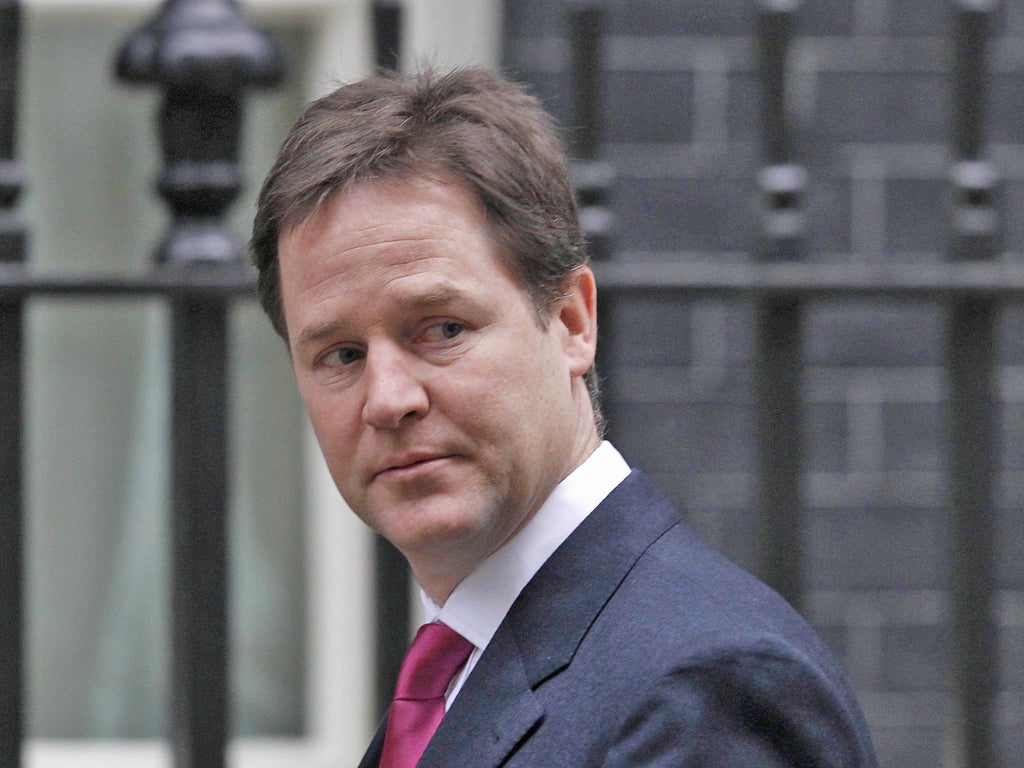Lib Dems lose three out of four of their voters
Survey shows huge collapse in popularity since party joined the Coalition

Your support helps us to tell the story
From reproductive rights to climate change to Big Tech, The Independent is on the ground when the story is developing. Whether it's investigating the financials of Elon Musk's pro-Trump PAC or producing our latest documentary, 'The A Word', which shines a light on the American women fighting for reproductive rights, we know how important it is to parse out the facts from the messaging.
At such a critical moment in US history, we need reporters on the ground. Your donation allows us to keep sending journalists to speak to both sides of the story.
The Independent is trusted by Americans across the entire political spectrum. And unlike many other quality news outlets, we choose not to lock Americans out of our reporting and analysis with paywalls. We believe quality journalism should be available to everyone, paid for by those who can afford it.
Your support makes all the difference.Only one in four people who voted Liberal Democrat at the last election still supports the party, according to new research.
Click HERE to view 'Lib Dem popularity contest' graphic
The YouGov survey of 4,300 who voted Liberal Democrat in 2010 suggests that the party's predicament may be even worse than the headline polling figures show. A quarter of those who backed Nick Clegg's party now support Labour, while another quarter are "don't knows" and the remaining quarter back other parties.
Worryingly for the Liberal Democrats, there are fewer signs than after previous elections of the party winning new supporters to replace the voters it has lost. Only 1 per cent of Labour and Conservative voters in 2010 has switched to the Liberal Democrats.
The one ray of hope is that one in four of their backers is now a "don't know" and could potentially be won back. The party's other target groups before the next election will be lost tactical voters and "missing new converts". Strategists say the party will aim to woo low to middle income families and women.
A Liberal Democrat source said last night: "We always knew that by going into coalition with the Conservatives, we would lose some people who voted for us to keep them out. It is a long haul but we think we can win people back by delivering in government."
A separate survey of 564 members by the Liberal Democrat Voice website shows that Mr Clegg's standing in his own party has recovered a little since his nadir a year ago after the party's damaging U-turn over university tuition fees. But he has not bounced back to the high ratings he won during the Coalition's "honeymoon phase".
Today Mr Clegg's net satisfaction rating – the difference between the number of people satisfied and dissatisfied with his performance – stands at + 32 per cent. This is higher than the +19 per cent and +17 per cent ratings recorded early last year, but still much lower than the +60 per cent he won in the summer of 2010.
When members were asked which Liberal Democrat minister had the "worst year" in 2011, Mr Clegg came joint top with Chris Huhne, the Energy and Climate Change Secretary.
The minister who made the best impression was Vince Cable, the Business Secretary. He was in the doldrums a year ago after announcing the trebling of tuition fees, when his net satisfaction rating dropped to +8 per cent. Now he is top of the performance league with +63 per cent.
In second place is Tim Farron, the party president (+60 per cent), followed by Lynne Featherstone, the Home Office Minister (+53), Steve Webb, the Pensions Minister (+51), Simon Hughes, the deputy leader, and Kirsty Williams, leader of the Welsh Liberal Democrats (both +45), who all outscore Mr Clegg.
According to Liberal Democrat Voice, almost two thirds of party members (62 per cent) broadly support the Coalition's deficit-reduction strategy, with only 22 per cent saying the cuts should be slowed.
Although Labour recently offered an olive branch, there seems little love for Labour among Liberal Democrat members. Only 9 per cent think Ed Miliband is doing well compared with 51 per cent for David Cameron.
Join our commenting forum
Join thought-provoking conversations, follow other Independent readers and see their replies
Comments